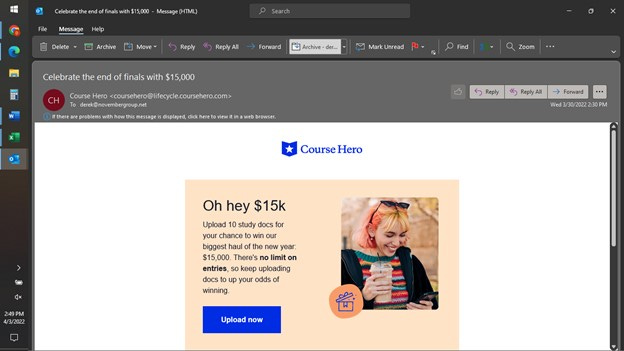Course Hero: Students Can "Win" $15,000 by Uploading Course Documents
Plus, a resignation for plagiarism at UNC. Plus, "Quick Bites." Yum.
Issue 106
To subscribe to “The Cheat Sheet,” enter your e-mail address below:
To share “The Cheat Sheet:”
Thanks for sharing “The Cheat Sheet.” If you enjoy or support my work, please consider chipping in via Patreon:
Course Hero Offering Students a Chance to Win $15,000 if They Upload Course Documents
Cheating provider Course Hero is offering students a chance to win $15,000 if they give away more course materials that the company can sell.
It’s anyone’s guess whether the uploaded content actually belongs to the students.
The e-mail subject is “Celebrate the end of finals.” Insidious.
Have you checked to see how much of your intellectual property is for sale on Course Hero? You can see how to do that in Issue 92.
Anyway, the Course Hero marketing train just keeps on rolling.
UNC Vice-Chancellor Resigned Over Plagiarism, Students Opine
If you missed it as I did, a Vice Chancellor for Research at the University of North Carolina (UNC) resigned that post - but perhaps not his teaching position - after plagiarism was discovered in a grant application he submitted. That was mid-March.
A few days ago, the student paper at UNC published an editorial from the Editorial Board on the resignation and its connection to student academic integrity. Quoting from it:
in a digital age where resources like Chegg, Course Hero, Quizlet and StackOverflow can make it easy to look up answers or get explanations for problems that we otherwise would be lost in, it can be hard to not use them.
Throughout the reign of "Zoom University," it was even more difficult for professors to monitor what their students were actually doing behind their computer screens. Short of using a lockdown browser, professors could only hope that students would stick to the honor code and not use online resources.
Chegg and Course Hero. And professors can “only hope” that students aren’t cheating when classes or programs are online.
You don’t say.
Anyway, the editorial takes the position that the resignation of the Vice Chancellor was a good thing, that it illustrated the value of academic integrity.
LSU Student Writes on Academic Misconduct Policies
A senior at Louisiana State University wrote for the student paper on the policies and potential punishments related to academic misconduct.
The piece is a bit squishy to follow but the student’s take seems to be that LSU’s policies on academic integrity are too harsh or too rigid - that long-term consequences should not be part of a finding of academic misconduct.
The title of the piece is:
University academic dishonesty policies need some room for understanding
It starts with this:
It is a busy school week. Assignments are piling up. You have exams in your two hardest classes. If you do not pass those exams, you will not get the credits you need to complete your degree.
On top of those exams, you have a project due in another class. You do not want to lose points for turning in late work, so you ask a friend to send you their project. You quickly paraphrase your friend’s work and turn it in as your own.
And ends with this:
Academic dishonesty policies lack compassion or understanding. Students accused of cheating are not dangers to the LSU campus. Academic dishonesty is a mistake students should have the chance to learn from.
I’m guessing the “compassion and understanding” are for being busy and having assignments pile up. Makes sense.
“The Cheat Sheet” Quick Bites:
In India, a professor bit a student who was cheating. This version of the story has a photo.
Also in India, teachers say students are behind in learning when they return to classrooms because - wait for it - they were cheating so much on their online assignments and tests. The worst parts, they say, were the parents cheating for their kids.



